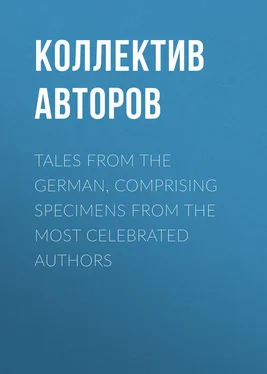Коллектив авторов - Tales from the German, Comprising specimens from the most celebrated authors
Здесь есть возможность читать онлайн «Коллектив авторов - Tales from the German, Comprising specimens from the most celebrated authors» — ознакомительный отрывок электронной книги совершенно бесплатно, а после прочтения отрывка купить полную версию. В некоторых случаях можно слушать аудио, скачать через торрент в формате fb2 и присутствует краткое содержание. Жанр: literature_18, foreign_antique, foreign_prose, Сказка, на английском языке. Описание произведения, (предисловие) а так же отзывы посетителей доступны на портале библиотеки ЛибКат.
- Название:Tales from the German, Comprising specimens from the most celebrated authors
- Автор:
- Жанр:
- Год:неизвестен
- ISBN:нет данных
- Рейтинг книги:4 / 5. Голосов: 1
-
Избранное:Добавить в избранное
- Отзывы:
-
Ваша оценка:
- 80
- 1
- 2
- 3
- 4
- 5
Tales from the German, Comprising specimens from the most celebrated authors: краткое содержание, описание и аннотация
Предлагаем к чтению аннотацию, описание, краткое содержание или предисловие (зависит от того, что написал сам автор книги «Tales from the German, Comprising specimens from the most celebrated authors»). Если вы не нашли необходимую информацию о книге — напишите в комментариях, мы постараемся отыскать её.
Tales from the German, Comprising specimens from the most celebrated authors — читать онлайн ознакомительный отрывок
Ниже представлен текст книги, разбитый по страницам. Система сохранения места последней прочитанной страницы, позволяет с удобством читать онлайн бесплатно книгу «Tales from the German, Comprising specimens from the most celebrated authors», без необходимости каждый раз заново искать на чём Вы остановились. Поставьте закладку, и сможете в любой момент перейти на страницу, на которой закончили чтение.
Интервал:
Закладка:
Various
Tales from the German, Comprising specimens from the most celebrated authors
INTRODUCTION
The object of the translators of the following tales was to present the English public with a collection, which should combine effectiveness with variety, and at the same time should contain specimens of the most celebrated writers of prose fiction whom Germany has produced. The names of the authors will, they think, be a sufficient guarantee that they have not failed in this last respect, and if the reader finds himself amused or interested by the series, they will have succeeded entirely.
It will be remembered that the collection is a collection of tales only, and that it was absolutely necessary, according to the plan of the book, that these tales should be numerous. Any thing like a lengthened novel was therefore excluded, as it would have exceeded the prescribed limits, or rendered impossible that variety which the translators considered an essential of their work. That short tales, from their very nature, cannot often promote any very high purpose, and that amusement for a leisure hour is their principal purpose, the translators are perfectly aware, admitting that their collection, generally speaking, does not convey that amount of instruction in life and thought, which might be obtained from more elaborate works, such as, for example, the Wilhelm Meister of Göthe. At the same time they trust that Kleist's Michael Koldhaas , Zschokke's Alamontade , Schiller's Criminal from Lost Honour 1 1 The fact that Schiller's "Ghost Seer" is so familiar in an English garb, that it is almost an English novel, is a sufficient reason that it does not appear in this collection. Almost the same may be said of the more celebrated romance of La Motte Fouqué.
and even Hauff's fanciful Cold Heart , will be acceptable to those who look for something beyond mere amusement, and that some readers will be found to appreciate the psychological truth and profundity of Hoffmann's tales beneath their fantastic exterior.
In their versions of the tales the translators have endeavoured, to the utmost of their power, to be correct, preferring even hardness of language to liberties with the original text. The initials in the table of contents will show who was the translator of each particular tale; but it must not be supposed that they worked so separately that the printer and the binder have alone connected the results of their labours. Every tale when finished by the translator was carefully revised by his colleague. In those instances alone have the translators deviated from the original, where they found passages and phrases that they conceived would not accord with English notions of propriety. That in such instances they have softened or omitted, needs no apology. 2 2 This has been especially the case with "Libussa," which is often indelicate in the original. An oversight in the translation of that tale should, however, be corrected. The provincial word, "Imme," should be translated "Queen-bee," not "ant." Vide p. 14, line 5 from the bottom.
It has been suggested to the translators that a notice of the authors and the works themselves might, with advantage, be prefixed to the collection. With this suggestion they have complied, trusting that the limited space allowed will be a sufficient excuse for the very sketchy nature of the biographies, if indeed the following notices are worthy of that name.
Göthe and Schiller have attained that universal celebrity, that it would be mere impertinence to say any thing about their lives in a sketch like this. Those eminent promoters of German literature in this country, Mr. T. Carlyle and Sir E. B. Lytton, have done all they could to make the English public familiar with the life of Schiller, and a tolerably full notice of his literary progress will be found in No. LX. of the Foreign Quarterly Review . Those who can read German are recommended to the elaborate life of Schiller by Dr. Hoffmeister, which is a perfect treasury of information and criticism. The materials for a biography of Göthe lie scattered through a vast quantity or correspondence, reminiscences, conversations, and characteristics; but a biography, such as the greatness of the subject requires, is still a desideratum in German literature.
The New Paris , by Göthe, which appears in this collection, is from that delightful autobiography, to which the poet has given the name of Dichtung und Wahrheit . The circumstances under which it is told are sufficiently explained by the short introduction prefixed to it. Schiller's Criminal from Lost Honour was written during what is called the "second period" of his life, when after the completion of Don Carlos he had quitted dramatic writing for a time, and devoted himself to the study of philosophy and history. The facts of the story he had learned from his friend Abel at an early period. Hoffmeister's remarks on this story may be found interesting.
"This misguided man, Wolf," says Hoffmeister, "appears as a mournful sacrifice to the law, which, from this example, should learn mercy. The severity of law has, from a merely conventional offence, elicited a grievous crime, and him, who sinned from thoughtlessness, and was delivered to the care of justice, she has cast off as though he were absolutely worthless. The progress in crime, which is gradually forced upon the man by civil institutions, and his return to virtue, when vice has completed her lesson, are developed and painted to our eyes with extraordinary art. Every action is deduced from thoughts and motives; and these, again, are deduced from states of mind, which necessarily result from the reciprocal action which the soul of the man, and the circumstances by which he was surrounded, had upon each other. Everywhere do we find natural connexion; not a link in the chain is wanting. This psychological novel, like a tragedy, awakens in the reader not only pity, but terror. He feels that in the situation of the unhappy man, he would not have been better himself. The writer fulfils his purpose of plucking us down from our proud security. Man is just as good or bad, we say to ourselves, as his external situation; out external situation is the fate of all of us; and we see in the history of a single individual a sketch of the common lot of man. Moreover, this history of the 'criminal' is so remarkable in point of style, that one always reads it with fresh interest. The language is extremely simple, clear, and natural, and there is not a trace of the wearisome, constantly occurring breaks, and the affected antitheses that marked Schiller's early style. Every thing shows that the author moved in a clear, free element. In some portions he has been eminently successful; as, for instance, in describing the poacher's state of mind, when he is about to point his gun, at his evil genius, Robert. If, after all our praise, we have one particular to blame, it is this circumstance, that the weakly and delicate 'host of the Sun,' who had not as yet distinguished himself in the trade of thieving, should have been unanimously chosen by the robbers for their leader, on his first entrance into their cave. Although he was well known to them as a good poacher, they might yet have reasonable doubts whether he was qualified to be their captain."
Before quitting Göthe and Schiller, it is as well to state that Göthe was born at Frankfort on the Maine, on the 28th of August, 1749, and died at Weimar on the 22nd of March, 1832; and that Schiller was born at Marbach, on the Neckar, on the 10th of November, 1759, and died at Weimar on the 9th of May, 1805.
Johann August Musäus, one of the most popular tale writers of Germany, was born at Jena, in 1735. His father was a justice there, and was soon afterwards removed to Eisenach, by an official appointment. Young Musäus was educated by a relation named Weissenborn, who held the situation of "General Superintendent" at Eisenach, and with whom he lived from the age of nine to that of nineteen. He studied theology for four years at Jena, and it is thought he might have succeeded as a pastor had not the peasants of Eisenach refused to accept him, because he had been convicted of the grievous crime of – dancing. In consequence of this check to his theological career, he turned his thoughts to literature, and made his first essay by a parody on Richardson's celebrated novel, called
Читать дальшеИнтервал:
Закладка:
Похожие книги на «Tales from the German, Comprising specimens from the most celebrated authors»
Представляем Вашему вниманию похожие книги на «Tales from the German, Comprising specimens from the most celebrated authors» списком для выбора. Мы отобрали схожую по названию и смыслу литературу в надежде предоставить читателям больше вариантов отыскать новые, интересные, ещё непрочитанные произведения.
Обсуждение, отзывы о книге «Tales from the German, Comprising specimens from the most celebrated authors» и просто собственные мнения читателей. Оставьте ваши комментарии, напишите, что Вы думаете о произведении, его смысле или главных героях. Укажите что конкретно понравилось, а что нет, и почему Вы так считаете.












